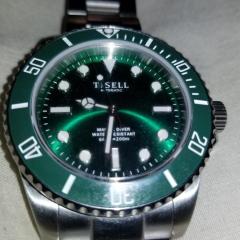Hunt for (a bit) more amplitude - Rolex 2135
-
Recently Browsing
- No registered users viewing this page.
-
Topics
-
Posts
-
As with every skill it watchmaking, it takes practice. Notice at the top of the document it says, "Practical work - 40 hours". I can get the balance wheels 'close enough' to flat, but never seem to get them perfect. Same with gear wheels. Guess I need more practice.
-
By transporter · Posted
Has it got a beat adjustment on the platform or is it a fixed hairspring? in short what you are looking at to get it just about in beat is to get the roller jewel sitting dead centre between the banking pins. So remove the platform and take of the pallet fork and escape wheel to give you clear line of site, sit the platform with the balance in place and with it level look between the banking pins and see if the roller jewel is sitting between them, if it is nice and central its there or there abouts in beat, if its not the the position of the pinned end of the hairspring needs to be adjusted to move the roller jewel into the correct position, thats why I asked if it has an adjustment on the platform or not, if it has its an easier job. -
I've managed to adjust it. I'm going to try and explain it as well as I can with my limited horology knowledge but I hope it helps someone in the future. There is a cam to the right of the front plate as shown in the picture. As the clock ticks along, the pin indicated in the gear comes around and slots into one of the silencer cam gaps, turning the cam. The pin completes a full rotation in 2 hours. To adjust the cam to start at the right time set the clock to just before 7. I did 6:45. Then I turned the silencer cam anticlockwise, which spins freely, until it pushed the silencer lever up and was placed just before the drop. Just before the 7AM indicated in the picture. All I then had to do was progress the hands to 7-7:15which made the pin slot into the silencer cam gap and turn the cam so the lever comes down again, unsilencing the clock. That was it. If anyone comes across this issue again I'd be happy to assist. Thanks again to everyone that helped. Hey Transporter! Thanks a lot for the reply. That was a really good explanation and I'm sure it would have made my troubleshooting a lot less painful haha. I'm sure someone will find it useful in the future. Thank you again for taking the time to try and help me out with this.
-
Now I'm completely confused, it would appear that the epilame is oleophobic as @Marc states: This oleophobic behavior can be seen as beading of the droplet (as above) which stops the oil spreading which is supported by what we observe on treated/untreated cap stones (for example), but as @VWatchie states this should make the drops more mobile and is supported by the literature: A review on control of droplet motion based on wettability modulation principles design strategies recent progress and applications.pdf However the hole point is that we have less mobile oil so an oleophobic would see to be the opposite of what we want. In fact this beading and high mobility are desirable properties in things like smart phone covers, see below. I am fairly sure that epilame doesn't make the droplets more mobile, so maybe its a strange coating with dual properties that are both oleophobic (beading) and cohesive/adhesive resulting in low mobility?? This may explain the high price??
-
By nickelsilver · Posted
The description there is exactly how it's done, and it's very well written!
-

.thumb.jpg.cb17a66989f1e796fd4217db2e9ca9df.jpg)





Recommended Posts
Join the conversation
You can post now and register later. If you have an account, sign in now to post with your account.
Note: Your post will require moderator approval before it will be visible.